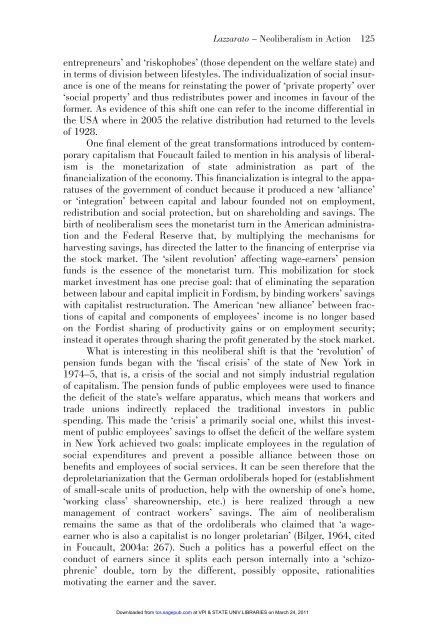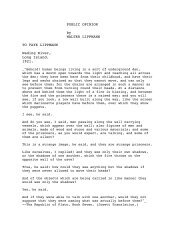Neoliberalism in Action Inequality, Insecurity and the Reconstitution ...
Neoliberalism in Action Inequality, Insecurity and the Reconstitution ...
Neoliberalism in Action Inequality, Insecurity and the Reconstitution ...
You also want an ePaper? Increase the reach of your titles
YUMPU automatically turns print PDFs into web optimized ePapers that Google loves.
Lazzarato – <strong>Neoliberalism</strong> <strong>in</strong> <strong>Action</strong> 125<br />
entrepreneurs’ <strong>and</strong> ‘riskophobes’ (those dependent on <strong>the</strong> welfare state) <strong>and</strong><br />
<strong>in</strong> terms of division between lifestyles. The <strong>in</strong>dividualization of social <strong>in</strong>surance<br />
is one of <strong>the</strong> means for re<strong>in</strong>stat<strong>in</strong>g <strong>the</strong> power of ‘private property’ over<br />
‘social property’ <strong>and</strong> thus redistributes power <strong>and</strong> <strong>in</strong>comes <strong>in</strong> favour of <strong>the</strong><br />
former. As evidence of this shift one can refer to <strong>the</strong> <strong>in</strong>come differential <strong>in</strong><br />
<strong>the</strong> USA where <strong>in</strong> 2005 <strong>the</strong> relative distribution had returned to <strong>the</strong> levels<br />
of 1928.<br />
One f<strong>in</strong>al element of <strong>the</strong> great transformations <strong>in</strong>troduced by contemporary<br />
capitalism that Foucault failed to mention <strong>in</strong> his analysis of liberalism<br />
is <strong>the</strong> monetarization of state adm<strong>in</strong>istration as part of <strong>the</strong><br />
f<strong>in</strong>ancialization of <strong>the</strong> economy. This f<strong>in</strong>ancialization is <strong>in</strong>tegral to <strong>the</strong> apparatuses<br />
of <strong>the</strong> government of conduct because it produced a new ‘alliance’<br />
or ‘<strong>in</strong>tegration’ between capital <strong>and</strong> labour founded not on employment,<br />
redistribution <strong>and</strong> social protection, but on sharehold<strong>in</strong>g <strong>and</strong> sav<strong>in</strong>gs. The<br />
birth of neoliberalism sees <strong>the</strong> monetarist turn <strong>in</strong> <strong>the</strong> American adm<strong>in</strong>istration<br />
<strong>and</strong> <strong>the</strong> Federal Reserve that, by multiply<strong>in</strong>g <strong>the</strong> mechanisms for<br />
harvest<strong>in</strong>g sav<strong>in</strong>gs, has directed <strong>the</strong> latter to <strong>the</strong> f<strong>in</strong>anc<strong>in</strong>g of enterprise via<br />
<strong>the</strong> stock market. The ‘silent revolution’ affect<strong>in</strong>g wage-earners’ pension<br />
funds is <strong>the</strong> essence of <strong>the</strong> monetarist turn. This mobilization for stock<br />
market <strong>in</strong>vestment has one precise goal: that of elim<strong>in</strong>at<strong>in</strong>g <strong>the</strong> separation<br />
between labour <strong>and</strong> capital implicit <strong>in</strong> Fordism, by b<strong>in</strong>d<strong>in</strong>g workers’ sav<strong>in</strong>gs<br />
with capitalist restructuration. The American ‘new alliance’ between fractions<br />
of capital <strong>and</strong> components of employees’ <strong>in</strong>come is no longer based<br />
on <strong>the</strong> Fordist shar<strong>in</strong>g of productivity ga<strong>in</strong>s or on employment security;<br />
<strong>in</strong>stead it operates through shar<strong>in</strong>g <strong>the</strong> profit generated by <strong>the</strong> stock market.<br />
What is <strong>in</strong>terest<strong>in</strong>g <strong>in</strong> this neoliberal shift is that <strong>the</strong> ‘revolution’ of<br />
pension funds began with <strong>the</strong> ‘fiscal crisis’ of <strong>the</strong> state of New York <strong>in</strong><br />
1974–5, that is, a crisis of <strong>the</strong> social <strong>and</strong> not simply <strong>in</strong>dustrial regulation<br />
of capitalism. The pension funds of public employees were used to f<strong>in</strong>ance<br />
<strong>the</strong> deficit of <strong>the</strong> state’s welfare apparatus, which means that workers <strong>and</strong><br />
trade unions <strong>in</strong>directly replaced <strong>the</strong> traditional <strong>in</strong>vestors <strong>in</strong> public<br />
spend<strong>in</strong>g. This made <strong>the</strong> ‘crisis’ a primarily social one, whilst this <strong>in</strong>vestment<br />
of public employees’ sav<strong>in</strong>gs to offset <strong>the</strong> deficit of <strong>the</strong> welfare system<br />
<strong>in</strong> New York achieved two goals: implicate employees <strong>in</strong> <strong>the</strong> regulation of<br />
social expenditures <strong>and</strong> prevent a possible alliance between those on<br />
benefits <strong>and</strong> employees of social services. It can be seen <strong>the</strong>refore that <strong>the</strong><br />
deproletarianization that <strong>the</strong> German ordoliberals hoped for (establishment<br />
of small-scale units of production, help with <strong>the</strong> ownership of one’s home,<br />
‘work<strong>in</strong>g class’ shareownership, etc.) is here realized through a new<br />
management of contract workers’ sav<strong>in</strong>gs. The aim of neoliberalism<br />
rema<strong>in</strong>s <strong>the</strong> same as that of <strong>the</strong> ordoliberals who claimed that ‘a wageearner<br />
who is also a capitalist is no longer proletarian’ (Bilger, 1964, cited<br />
<strong>in</strong> Foucault, 2004a: 267). Such a politics has a powerful effect on <strong>the</strong><br />
conduct of earners s<strong>in</strong>ce it splits each person <strong>in</strong>ternally <strong>in</strong>to a ‘schizophrenic’<br />
double, torn by <strong>the</strong> different, possibly opposite, rationalities<br />
motivat<strong>in</strong>g <strong>the</strong> earner <strong>and</strong> <strong>the</strong> saver.<br />
Downloaded from<br />
tcs.sagepub.com at VPI & STATE UNIV LIBRARIES on March 24, 2011





